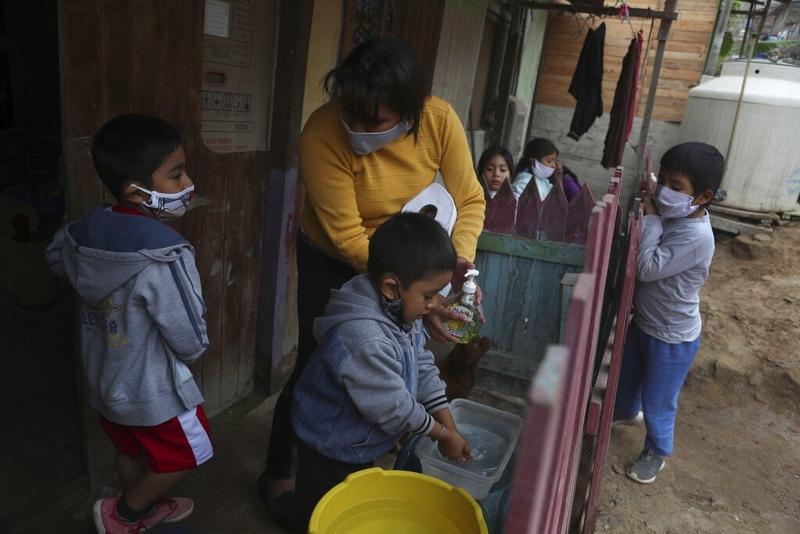 A primary school teacher supervises as pupils wash their hands before class to prevent the spread of the coronavirus. In Puente Piedra shantytown on the outskirts of Lima, Peru, June 1, 2020. (MARTIN MEJIA / AP)
A primary school teacher supervises as pupils wash their hands before class to prevent the spread of the coronavirus. In Puente Piedra shantytown on the outskirts of Lima, Peru, June 1, 2020. (MARTIN MEJIA / AP)
TRIPOLI / MEXICO CITY / SANTIAGO / NEW YORK / GENEVA / RIO DE JANEIRO / ROME / LONDON / PARIS / PRAGUE / CAIRO / ABUJA / MADRID / STOCKHOLM / MOSCOW / DAKAR - New cases of COVID-19 reported daily are steadily declining in Western Europe, but not in hotspots in Russia and Eastern Europe, the World Health Organization (WHO) said on Tuesday.
Spokeswoman Margaret Harris said at a briefing: "At the moment in Europe, in Western Europe, we are seeing a steady decline. It's not speedy but there's a steady decline in new cases being reported daily, so that means that the number of new cases are still significant but the number is coming down except for Russia and Eastern Europe where we are still seeing the rise."
At the moment in Europe, in Western Europe, we are seeing a steady decline ... except for Russia and Eastern Europe where we are still seeing the rise.
Margaret Harris, WHO spokeswoman
On Monday, the WHO said that Central and South America have now become intense zones of COVID-19 transmission, and solidarity and support are needed to help them overcome the virus.
"Five of the ten countries worldwide reporting the highest new number of cases in the past 24 hours are in the Americas: Brazil, USA, Peru, Chile and Mexico, and ... the biggest increases are (in) Brazil, Colombia, Chile, Peru, Mexico, Haiti, Argentina, Bolivia. And while the numbers are not exponential in some countries, we are seeing a progressive increase in cases on a daily basis," Michael Ryan, executive director of WHO Health Emergencies Programme said in a press conference on Monday in Geneva.
"Clearly the situation in many South American countries is far from stable. There's been a rapid increase in cases and those systems are coming under increasing pressure and they need our support, they need our solidarity," Ryan said.
ALSO READ: Pandemic: WHO warns of higher rates of antimicrobial resistance
"We're particularly concerned about places like Haiti, because of the inherent weakness in the system. There are other countries in the Americas in which health systems are also weak," he said.
Also on Monday, the WHO chief said that the WHO hoped to continue cooperation with the United States.
WHO Director-General Tedros Adhanom Ghebreyesus said that the US government and people's contribution and generosity towards global health over many decades have been immense, and have made a great difference in public health all around the world.
READ MORE: Trump says US terminating relationship with WHO
Global tally
More than 6 million confirmed COVID-19 cases globally have been reported to the WHO as of Monday afternoon, the latest WHO dashboard on the disease showed.
According to the dashboard, as of 1:55 pm CET on Monday, globally there had been 6,057,853 confirmed cases, including 371,166 deaths, reported to the WHO.
Belarus
Belarus reported 852 new confirmed COVID-19 cases on Tuesday, taking its total to 44,255.
Of all the country's confirmed cases, 19,195 people have recovered so far, while 243 people with chronic diseases have died, according to the country's health ministry.
As of Tuesday, close to 563,000 tests for COVID-19 have been conducted across the country, the ministry said.
Albania
Albania reopened its land borders and let people move around freely on Monday after 79 days of coronavirus curbs, but will still ban mass activities until June
23.
Despite a spike in daily infections last week, the situation was "stable", a health official said. With a population of 2.8 million, Albania has had just 1,143 COVID-19 cases and 33 deaths.
Sports, especially much-missed soccer, will restart this week without fans. Parks, internet centres and gyms also opened on Monday under new hygiene guidelines. Shops are already open.
Mass transport, cinemas, theatres, nightclubs, swimming pools, weddings, conferences and public hearings won't reopen until June 23.
Keen to help tourism make up its losses, Albania also opened beaches serving hotels on Monday and allowed ethnic Albanians to come on holiday.
Brazil
Brazil registered 11,598 new confirmed cases of the novel coronavirus and 623 additional deaths in the last 24 hours, the nation's health ministry said on Monday evening.
Brazil now has registered a total of 526,447 confirmed cases and 29,937 deaths attributed to the virus.
READ MORE: Brazil overtakes Spain, now fifth in the world in virus deaths
More than a quarter of the confirmed cases in Brazil's southernmost state of Rio Grande do Sul are among meat plant workers, the labor prosecutors' office said on Monday.
The prosecutors said in a statement that an estimated 2,399 employees from 24 slaughterhouses in 18 municipalities of the state have been infected. That equates to 25.7 percent of the 9,332 confirmed cases in Rio Grande do Sul as of Sunday, according to health ministry statistics.
Canada
Canadian Prime Minister Justin Trudeau announced Monday that his government will offer cities an advanced transfer of 2.2 billion Canadian dollars (US$ about 1.6 billion) in infrastructure money to help cover COVID-19-caused budget shortfalls.
"This is strong support to keep Canadians safe and our communities strong. And it's support that will give businesses the confidence to reopen, getting hardworking Canadians back on the job," Trudeau said at Monday's press conference on the COVID-19 pandemic.
The money will be made in a single payment this month to help municipalities recover from the pandemic as quickly as possible. Municipalities will have flexibility to use the funding to meet local needs, including for projects like boosting access to high-speed broadband or improving roads and water systems, Trudeau said.
As of Monday noon, Canada reported 91,647 cases of COVID-19, with 7,325 deaths and 49,225 recoveries.
Chile
Chile on Monday reported a total of 105,159 cases of COVID-19 and 1,113 deaths.
In the past 24 hours ending 9 pm local time Sunday, 5,471 new cases were detected and another 59 deaths were registered, the health ministry said.
As Chile's outbreak continues to expand at a rapid pace, Health Minister Jaime Manalich said lockdown measures that were in place in the capital Santiago and other parts of the country would take time to curb the spread of the coronavirus.
Uganda
Uganda's ministry of health on Tuesday reported 32 new cases of COVID-19, bringing the total number of infections in the country to 489.
Out of the 2,276 samples collected from cross-border cargo truck drivers and communities over the last 24 hours, 19 Ugandan truck drivers and 13 contacts and alert cases tested positive for the virus, said the statement.
Czech Republic
The Czech Republic said on Monday it would open up foreign travel from June 15 after introducing a new colour-coded system to classify other countries according to their coronavirus risk.
Czechs will be able to travel without restrictions to immediate neighbors Germany, Austria, Poland and Slovakia, along with Hungary, Romania or Bulgaria as part of its green tier. Other safe countries include Croatia, Greece, Cyprus, Switzerland, the Baltic states, and Finland, Norway and Iceland.
Citizens from those countries will be allowed in without having to present a negative COVID-19 test, Health Minister Adam Vojtech said on Twitter.
The government placed France, Spain, Portugal, Italy, as well as Ireland, Denmark, the Netherlands and Belgium in its orange tier, allowing Czechs to travel to those countries without restrictions. However, those countries' citizens will need to present a COVID-19 test.
Britain and Sweden were placed in the riskiest red category, meaning Czechs returning from trips there and citizens of those countries need to have a test.
The government also agreed to raise the number of people allowed at events to 500 from June 8, and 1,000 later.
The Czech Republic has reported 9,286 confirmed cases, with 6,642 recovering so far. The death toll stands at reached 321.
Djibouti
Djibouti's Ministry of Health on Monday announced 215 new COVID-19 cases, bringing the total number of confirmed cases in the country to 3,569 as of Monday afternoon.
The ministry also announced that some 1,521 patients have recovered as of Monday afternoon, of which 17 of the recoveries were reported in the past 24 hours.
The death toll stands at 24.
Egypt
Egypt confirmed 1,399 new cases of the novel coronavirus on Monday, the health ministry said, its first decline for a week.
That is down from 1,536 reported the day before, but still almost double the number on the same day a week ago.
Egypt has reported a total of 26,384 cases, of which 6,297 have recovered and 1,005 died, the ministry said.
Earlier in the day, Egypt's Prime Minister Mostafa Madbouly said his country is expected to witness a surge in the number of coronavirus patients in the next two weeks, according to official Ahram Online new website.
France
France will push on with tax-cut plans and broad economic overhauls to help the country rebound from a recession that will be deeper than previously anticipated, Finance Minister Bruno Le Maire said Tuesday.
"We're going to pay for it with growth," Le Maire said, adding that a budget update being prepared would forecast a contraction of 11 percent versus one of 8 percent forecast previously.
France imposed one of the Europe's strictest lockdowns in mid-March to curb the spread of the coronavirus and only began removing restrictions on May 11.
On the eve of the second phase of de-confinement, France recorded 31 COVID-19 deaths in the last 24 hours, the lowest daily increase since mid March, bringing the overall death toll to 28,833, the health ministry said on Monday.
The ministry said fatalities from nursing homes would be updated on Tuesday.
The ministry also said that there were still 14,288 cases in hospital on Monday, a slight drop from 14,322 on Sunday, compared with 16,798 a week ago.
Germany
Germany recorded a drop in the number of new coronavirus cases, while the infection rate rose for a fourth day, climbing higher above the key threshold of 1.0.
There were 184 new cases in the 24 hours through Tuesday morning, bringing the total to 183,594, according to data from Johns Hopkins University. That compares with 221 the previous day and almost 7,000 at the peak of the pandemic in late March.
Fatalities increased by 15 to 8,555.
The reproduction factor of the virus, known as R-naught, rose to 1.20 on Monday from 1.04 the day before, according to the latest estimate from the Robert Koch Institute (RKI).
According to data from RKI on Tuesday, the number of confirmed cases increased by 213 to 182,028. The reported death toll rose by 11 to 8,522, RKI tally showed.
Chancellor Angela Merkel will seek to broker a compromise later Tuesday on a second stimulus package to help Europe’s biggest economy recover from the deep recession caused by the coronavirus. The package would be worth between 50 billion euros (US$56 billion) and 100 billion euros, a person with knowledge of the matter told Bloomberg last week.
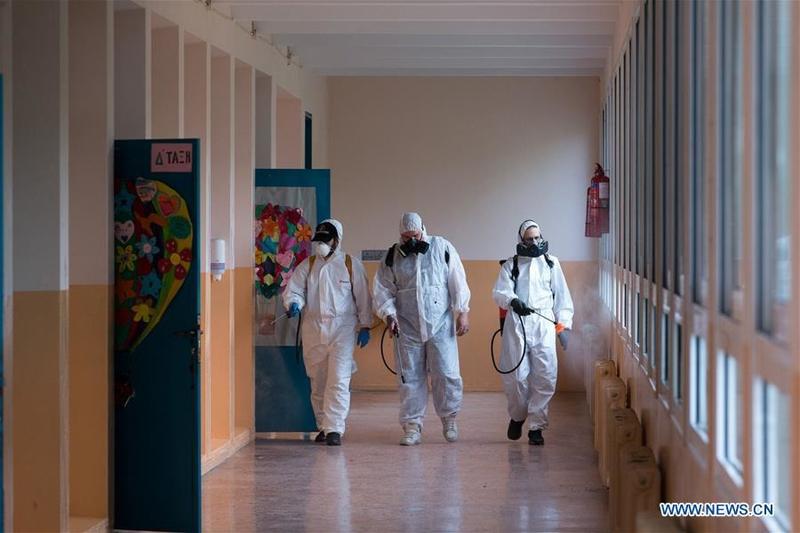 Employees of the Municipality of Athens disinfect a hallway at a primary school in Athens, Greece, May 31, 2020. (MARIOS LOLOS / XINHUA)
Employees of the Municipality of Athens disinfect a hallway at a primary school in Athens, Greece, May 31, 2020. (MARIOS LOLOS / XINHUA)
Greece
Greece took another step to normalcy on Monday with the reopening of primary schools and kindergartens, open-air cinemas, hotels and swimming pools, among other businesses that had been closed since March as part of measures to control the spread of the coronavirus.
Land border arrivals from Albania, North Macedonia, and Bulgaria will be allowed as of June 15, and visitors will be subject to random tests upon arrival, according to a press statement by the Foreign Ministry.
As of July 1, international flights are allowed into all airports in Greece and visitors are subject to random tests upon arrival, while additional restrictions regarding certain countries will be announced at a later date, the ministry said in the statement.
Furthermore, arrivals by sea will be allowed as of July 1, and visitors will be also subject to random tests upon arrival, according to the statement.
According to the latest update by the National Public Health Organization (EODY) on Monday, a total of 2,918 confirmed cases have been registered in Greece, and the death toll stands at 179.
Italy
Italian Prime Minister Giuseppe Conte marked Italy’s national day with an appeal to citizens to work together to revive the country, as his government prepares to lift restrictions on domestic travel from Wednesday.
Italy on Monday released a contested mobile app to trace coronavirus infections in four regions before extending it to the whole country, despite widespread resistance from people concerned about invasion of privacy.
The app, dubbed "Immuni" (immune), is aimed at reducing the risk of such flare-ups by recording when users are in close proximity with each other. If a person tests positive for the virus, the app tells recent contacts to self-isolate and get tested, helping health authorities to react quickly and limit contagion.
Italy's COVID-19 deaths climbed by 60 on Monday, against 75 the day before, the Civil Protection Agency said, while the daily tally of new cases fell to just 178 from 355 on Sunday.
The total death toll now stands at 33,475, the agency said, the third highest in the world after those of the United States and Britain.
The number of confirmed cases amounts to 233,197, the sixth highest global tally behind those of the United States, Russia, Brazil, Spain and Britain.
People registered as currently carrying the illness fell to 41,367 from 42,075 the day before.
Kenya
Kenya's Ministry of Health on Monday confirmed 59 new cases of the coronavirus, bringing the tally in the country to 2,021.
Mutahi Kagwe, cabinet secretary in the Ministry of Health, said five more deaths were reported on Monday, bringing the death toll to 69.
Kagwe also said eight more patients have recovered, raising the total number of recoveries to 482.
Libya
The National Center for Disease Control of Libya on Monday reported 12 new COVID-19 cases, bringing the caseload in the country to 168, with 52 recoveries and five deaths.
In a statement late Monday, the center said it received a total of 658 suspected cases, 646 of whom tested negative and 12 positive.
All the new infections are in southern Libya, the center said.
The southern city of Sabha recorded nearly half of the total number of COVID-19 cases in the North African country in less than a week after the report of the first case in the city.
Malta
Malta will lift most COVID-19 restriction measures from Friday, with exceptions for schools and contact sports, Prime Minister Robert Abela announced on Monday.
He said that bars, gyms and other establishments will be allowed to open again, but with restrictions on the number of people inside and full respect of social distancing rules. Childcare centres will also reopen with certain restrictions, with no details made available at Monday's press conference.
From July 1, Malta will reopen its airport for certain countries and regions, including the Italian regions of Sicily and Sardinia, Iceland, Slovakia, Cyprus, Latvia, Lithuania, Israel, Switzerland, Norway, Estonia, Denmark, Hungary, Austria, Luxembourg, Germany, the Czech Republic, Finland and Ireland. The relaxed measures apply only to direct flights, and passengers will have to guarantee that they have stayed in the same country for four weeks prior to the flight.
Abela said that no tourists will be forced to spend any time in quarantine and none of those arriving in Malta will be swabbed for the virus.
As of Monday, Malta had reported 619 confirmed cases, of which 537 patients had recovered while 73 cases are still active.
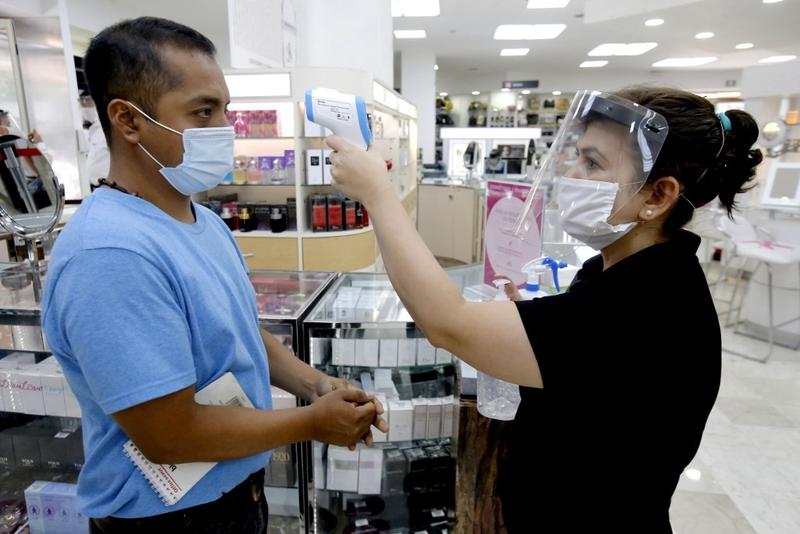 A woman checks the temperature of a customer at the entrance of a store in Guadalajara, Jalisco State, Mexico, on June 1, 2020 after the country began gradually reopening its economy after more than two months of shutdown because of the COVID-19 coronavirus pandemic. (ULISES RUIZ / AFP)
A woman checks the temperature of a customer at the entrance of a store in Guadalajara, Jalisco State, Mexico, on June 1, 2020 after the country began gradually reopening its economy after more than two months of shutdown because of the COVID-19 coronavirus pandemic. (ULISES RUIZ / AFP)
Mexico
Tens of thousands of workers lined up before dawn to return to work at automotive factories along Mexico's northern border on Monday, the first day that industries joined the country's list of essential activities beginning to reopen.
Mexico's government allowed automotive, aerospace, construction and mining companies to reopen on Monday. President Andres Manuel Lopez Obrador traveled to Quintana Roo state to launch construction of a tourist train.
Ciudad Juarez Mayor Armando Cabada estimated that 30 percent of the city's factory workforce of 300,000 people had returned to their posts, in line with state guidelines to gradually ramp up production.
Mexico's death toll on Monday reached 10,167 after the health ministry reported an additional 237 deaths. Another 2,771 cases brought total known infections to 93,435, although health officials have said the real number is higher.
Morocco
Morocco on Monday announced 26 new COVID-19 cases, bringing the tally in the North African country to 7,833.
Another 434 patients have recovered from the disease, taking the tally of recoveries to 5,893, with some 13 patients being treated in intensive care units, said Mouad Mrabet, coordinator of the Moroccan Centre for Public Health at a press briefing.
Nigeria
Nigeria will relax coronavirus restrictions on places of worship from Tuesday, the chairman of the presidential task force for COVID-19 said.
Nigeria, Africa's most populous country where Christianity and Islam are widely practiced, has recorded 10,578 confirmed cases and 299 deaths.
Boss Mustapha, the country's most senior civil servant, said that Nigeria had not reached the peak of confirmed cases.
He, however, said a lockdown in the northern city of Kano would be eased, one of a number of changes over four weeks from Tuesday.
Another official said the aviation industry had been asked to prepare for the possible resumption of domestic flights from June 21. He added that a national curfew would be shortened to 10 pm to 4 am from Tuesday, from the current 8 pm to 6 am order.
Nigeria's financial sector will also be able to resume normal working hours, said Sani Aliyu, the national coordinator of the task force.
Other curbs remain in place, such as a ban on interstate travel, with a few exceptions, such as for essential workers. Also, face masks must still be worn in public.
Peru
Peru on Monday reported 5,563 new COVID-19 cases and another 128 deaths, bringing the total caseload of infections to 170,039 and the death toll to 4,634.
Among the worst-hit areas, Lima, the capital, had registered 103,020 cases, followed by the west-central province of Callao with 12,495 cases, the health ministry said in a statement.
"To date, 8,868 patients are hospitalized with COVID-19, including 975 in ICUs (intensive care units) and on ventilators," it said.
Russia
Russia reported 8,863 new cases of the coronavirus on Tuesday, pushing its nationwide tally to 423,741, the world's third highest reported total.
The death toll rose to 5,037 after authorities said 182 people had died in the last 24 hours.
READ MORE: Russia to roll out its first approved virus drug next week
Senegal
Senegal has postponed the reopening of schools until further notice after several teachers tested positive for the new coronavirus, the education ministry said late on Monday.
Schools were scheduled to gradually resume on Tuesday, after weeks of shutdown due to the pandemic. Senegal has so far recorded 3,739 positive COVID-19 cases, with 43 deaths.
According to a statement by the education ministry statement, teachers tested positive for coronavirus in Ziguinchor, in the Casamance area, south of the country.
President Macky Sall decided to "postpone the restart of classes until a later date, in order to avoid any risk of the virus spreading in schools," the ministry said in the statement.
Slovakia
Slovakia will undo more coronavirus restrictions from Wednesday, including opening indoor sports centres and pools, as the country with one of the world's lowest death rates from the outbreak moves ahead with reopening.
The government agreed on Monday to relax rules in restaurants by cutting the distance between customers, open up sports events to limited crowds and make it easier to visit people in hospital, Prime Minister Igor Matovic said at a televised news conference.
From June 10, up to 500 people will be allowed at public events and the limit will rise to 1,000 from July.
As of Sunday, Slovakia had reported 1,522 cases, of which 1,368 have recovered. The death toll stood at 28 and has not risen since the middle of May.
Somalia
Somalia's health ministry on Monday confirmed 47 new cases of the coronavirus, bringing the tally in the country to 2,023.
Health Minister Fawziya Abikar said one death was reported in the last 24 hours, bringing the death toll to 79.
Abikar said 13 more patients have recovered, bringing the total number of recoveries to 361.
South Africa
The number of COVID-19 cases in South Africa continued to rise on Monday as the country moved to a lower level of lockdown restrictions.
South Africa's confirmed COVID-19 cases surged to 35,812 on Tuesday, the second day the country further eased lockdown restrictions.
In the past 24 hours, the country reported 1,455 new cases, Health Minister Zweli Mkhize said before ending a two-day visit to the Western Cape to assess the province's readiness to cope with the rapid surge in COVID-19 cases.
The Western Cape remains the epicenter of the pandemic with 23,583 cases as of Tuesday, comprising about two thirds of the national tally, according to Mkhize.
READ MORE: African nations remain vigilant on health
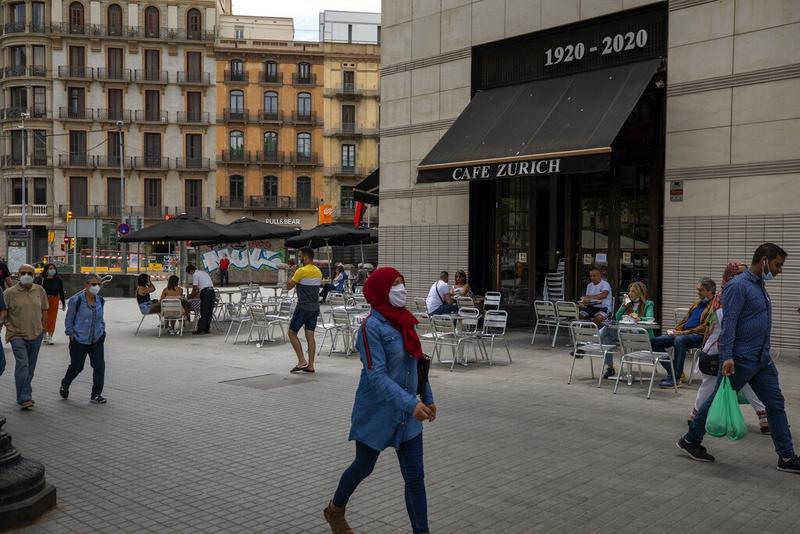 In this June 1, 2020 photo, people wearing face masks walk past a terrace bar with local customers in Barcelona downtown. (EMILIO MORENATTI / AP)
In this June 1, 2020 photo, people wearing face masks walk past a terrace bar with local customers in Barcelona downtown. (EMILIO MORENATTI / AP)
Spain
Spain's health ministry reported zero deaths from the new coronavirus on Monday, with the total death toll unchanged from Sunday at 27,127, the health ministry said.
It said the total number of COVID-19 infections increased by 71 from Sunday to 239,638.
Sudan
The Sudanese government on Monday decided to extend the full curfew in Khartoum State for two weeks to prevent the spread of COVID-19.
Restriction on domestic transport and the ban on travels between the capital and the states have also been extended, Siddiq Tawer, chairman of the Higher Committee for Health Emergencies, said.
The health ministry on Monday announced 147 new COVID-19 cases and another 12 deaths, bringing the tally in the country to 5,173 and the death toll to 298.
According to the ministry, 99 more patients have recovered, taking the total recoveries to 1,522.
Sweden
Sweden will launch an inquiry into the country's handling of the pandemic before the summer, Prime Minister Stefan Lofven said in a newspaper interview on Monday, amid growing criticism over nursing home deaths and the lack of testing.
More than 4,000 people in Sweden, roughly half of them nursing home residents, have died in the pandemic.
While the mortality rate over the course of the outbreak has been lower than in some countries that opted for hard lockdowns, such as Italy and Britain, Sweden had the highest number of COVID-19 deaths in Europe relative to the size of the population through parts of May.
Tunisia
Tunisia will open its sea, land and air borders on June 27, authorities said on Monday, in hopes of rescuing its tourism industry as the coronavirus pandemic comes under control.
The government said also it will allow movement between cities again from Thursday.
The North African country has recorded 1,070 cases and 48 deaths, with only two people still in hospital.
UK
Deaths involving the coronavirus in England and Wales fell to the lowest since the lockdown began in March, a sign that restrictions on movement proved effective in reducing fatalities.
Almost 2,590 deaths registered in England and Wales mentioned the virus on the death certificate in the week ended May 22, the Office for National Statistics (ONS) said on Tuesday. That was a drop of 32 percent from a week earlier, and the lowest since the week of March 27, when the government introduced the lockdown.
According to the latest available data, some 62,000 more people than usual have died in the United Kingdom during the pandemic, an expert from ONS said.
British health minister Matt Hancock has spoken to the head of the country's statistics watchdog to pledge his commitment to work closely with it after David Norgrove criticised the government for publishing testing data that were "far from complete".
The government faced widespread mockery over coronavirus rules which were cast by some media as a "sex ban", though British junior housing minister Simon Clarke said the regulations were aimed at keeping people safe.
Under amendments introduced to English rules on Monday, no person may participate in a gathering which takes place in a public or private place indoors and consists of two or more persons.
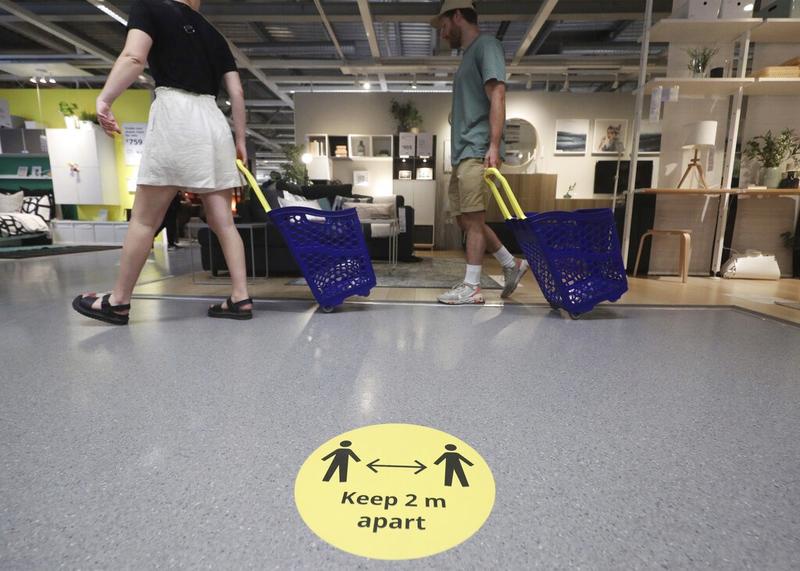 A sticker encouraging customers to observe social distancing by keeping 2 meters apart from each other is seen on the ground inside the IKEA Tottenham store in London, June 1, 2020. (YUI MOK / PA VIA AP)
A sticker encouraging customers to observe social distancing by keeping 2 meters apart from each other is seen on the ground inside the IKEA Tottenham store in London, June 1, 2020. (YUI MOK / PA VIA AP)
Another 111 COVID-19 deaths were registered as of Sunday afternoon, bringing the death toll in the country to 39,045, Health Secretary Matt Hancock said Monday. It was the lowest daily toll since a lockdown began in March.
Hancock said Britain's new coronavirus test-and-trace system is working well and some of the thousands of contact-tracers who have been recruited are not yet fully occupied.
ALSO READ: England's COVID-19 test and trace system begins
Amid forecasts of the worst recession in 300 years, Chancellor of the Exchequer Rishi Sunak is drawing up options to bolster the economy after the government withdraws its vast package of financial support in the months ahead, according to people familiar with the matter.
Meanwhile, the government ministers are aiming to replace coronavirus quarantine for people arriving at airports by the end of June, with so-called air bridges being considered as an option, the Telegraph newspaper reported. The policy of air bridges is meant to enable people from other countries who have achieved lower levels of coronavirus infection to come to Britain.
US
The number of COVID-19 cases in the United States topped 1.8 million on Monday, reaching 1,808,291 as of 6:33 pm (2233 GMT), according to the Center for Systems Science and Engineering at Johns Hopkins University.
The national death toll hit 105,003, according to the tally.
New York remains the hardest-hit state with 371,711 cases and 29,833 fatalities. Other states with over 100,000 cases include New Jersey, Illinois, California and Massachusetts, according to the tally.
Close to 26,000 nursing home residents were killed by COVID-19, the US government said Monday, the first nationwide tally of a population especially hard hit by the disease. There were 60,000 COVID-19 cases in nursing homes, the US Centers for Medicare and Medicaid Services said in a news release describing the findings.
In Michigan, Governor Gretchen Whitmer eased social-distancing rules by repealing her shelter-in-place order and allowing outdoor gatherings of as many as 100 people. In-person office work and a reopening of restaurants on June 8 - so long as eateries restrict to 50 percent capacity and place tables 6 feet apart - will also be allowed.
In New Jersey, Governor Phil Murphy said the state has entered the second stage of its four-step reopening plan, with outdoor dining and hair salons slated to start in mid-June.
Zimbabwe
Zimbabwe recorded 26 new cases of COVID-19 on Monday, bringing the total number of cases in the country to 203.
The number of active cases stands at 170 while the death toll remains at four, the Ministry of Health and Child Care said in a statement Tuesday. The number of recoveries stands at 29, according to the statement.


